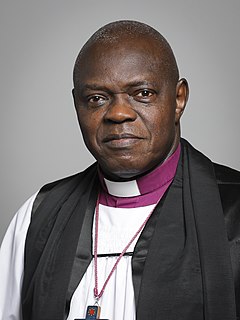A Quote by John Sentamu
If the rights of civil partners are met differently in law to those of married couples, there is no discrimination in law, and if civil partnerships are seen as somehow 'second class' that is a social attitude which will change and cannot, in any case, be turned around by redefining the law of marriage.
Related Quotes
From the new hate crimes law to the repeal of DOMA and 'Don't Ask, Don't Tell,' to the emerging popular support for marriage equality, we are making progress at breakneck speed. As someone who has dedicated most of my career to civil rights law, I am deeply moved by this sea change and proud to have done my part.
I don't want to be married. I'm very happy with a civil partnership. If gay people want to get married, or get together, they should have a civil partnership. The word 'marriage,' I think, puts a lot of people off. You get the same equal rights that we do when we have a civil partnership. Heterosexual people get married. We can have civil partnerships.
I've called on Congress to repeal the so-called Defense of Marriage Act to help end discrimination to help end discrimination against same-sex couples in this country. Now, I want to add we have a duty to uphold existing law, but I believe we must do so in a way that does not exacerbate old divides. And fulfilling this duty in upholding the law in no way lessens my commitment to reversing this law. I've made that clear.
I support ensuring that committed gay couples have the same rights and responsibilities afforded to any married couple in this country. I believe strongly in stopping laws designed to take rights away and passing laws that extend equal rights to gay couples. I've required all agencies in the federal government to extend as many federal benefits as possible to LGBT families as the current law allows. And I've called on Congress to repeal the so-called Defense of Marriage Act and to pass the Domestic Partners Benefits and Obligations Act.
The civil magistrate cannot function without some ethical guidance, without some standard of good and evil. If that standard is not to be the revealed law of God (which, we must note, was addressed specifically to perennial problems in political morality), then what will it be? In some form or expression it will have to be the law of man (or men) — the standard of self-law or autonomy.
The foundations of modern civil-rights law are exceptionally secure. Conservative judges nibble around the edges sometimes, and people still debate the constitutionality of affirmative-action programs. But almost no one seriously argues about the basic meaning or legitimacy of core civil-rights protections.
When I used to teach civil procedure as a law professor, I would begin the year by telling my students that “civil procedure is the etiquette of ritualized battle.” The phrase, which did not originate with me, captured the point that peaceful, developed societies resolve disputes by law rather than by force.



































